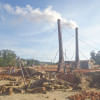Stop brick kilns from devouring farmlands

While the devastating impacts of brick kilns have long been known, newly released figures have brought focus to a particularly important aspect of this issue. On Tuesday, the environment minister said in parliament that 13 crore tonnes of agricultural soil are being destroyed annually because of these kilns. The question is, why hasn't the government—clearly informed about the danger—taken meaningful actions to save our farmlands?
While relaying this information, the minister touched on how brick kilns, 4,505 of which have no environmental clearance, are exasperating our food security issues. This cannot be emphasised enough. Last year, a report by this daily highlighted the unmitigated damage to cropland fertility and agricultural production caused by the rampant practice of extracting topsoil—the layer of soil dense with organic matter and minerals that plants need to grow—to make bricks. Using agricultural or hill soil for this purpose is a punishable offence, but the sheer frequency of this activity makes it seem like the relevant laws don't even exist.
The minister also made another point, that closing or demolishing brick kilns is not the only solution. We agree, but the government has little to show for it. Time and again, we have observed how closed or demolished kilns have resumed operation days after a government drive. Out of the nearly 1,000 shut kilns, 75 percent have resumed operation. Clearly, government measures are not bearing any fruit. While it's important to systematically close offending kilns to safeguard our future, we have to keep in mind that without reversing the economic incentives fuelling illegally run kilns, our actions will be in vain. The path to development requires countless building blocks, and some businessmen are taking advantage of this need.
In the last four years, almost 1,500 illegal brick kilns have been established, and if the government sits idle, the number will keep growing. Experts have suggested adopting alternatives, such as the environment-friendly "hollow blocks", that will greatly reduce our dependence on bricks. When the demand is down, these kilns will have little incentive to carry on with their devastating activity. Therefore, what the authorities must do is increase the production of eco-friendly blocks while improving vigilance to prevent brick kilns from ravaging our lands for topsoil. With the right measures and political will, the threat of these polluting establishments can be addressed.


 For all latest news, follow The Daily Star's Google News channel.
For all latest news, follow The Daily Star's Google News channel. 










Comments